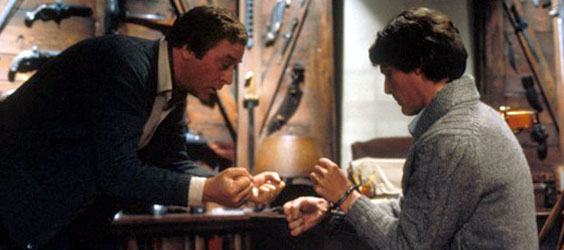Few people constructed plots more tightly or more delightfully–in a macabre way–than Ira Levin. Stephen King called him “the Swiss watchmaker of suspense novels.” With the exception of Son of Rosemary, one of the worst books in the world, no Levin is bad and many are excellent. Deathtrap falls into the in-between category, neither masterpiece nor (thankfully) monstrosity, and it could have achieved masterpiece status if its clockwork didn’t gleam so brightly that it distracted from everything else.
The film adaptation stars a coldblooded but in-over-his-head Michael Caine as a thriller playwright who has seen his last few productions flop. He retreats to his house in Long Island, which is so gorgeous it threatens to derail the entire story into a Better Homes and Gardens entry, because, come on:
I want a windmill.
Anyway, Sidney (Caine) rants to his wife, Myra (Dyan Cannon), that the worst part is that he has received a flawless script from a first-timer, a former student of his named Clifford whom he can barely remember, who has sent it to him with thanks and in the hopes that he’ll have comments on it. Sidney says that what he ought to do is kill Clifford (Christopher Reeve) and present the script as his own and have a smash hit. Myra laughs and then, over the course of the evening, stops laughing. Sidney is edgy and tightly-wound, feeling out Clifford for whether or not he’s told anyone else about his play. Clifford is seemingly innocently antagonizing Sidney by cheerfully talking about how Deathtrap isn’t the product of patient revision but of a perfect first draft. Sidney says, Let’s try out some of these Houdini handcuffs. Oh, wait, I can’t seem to find the key… just let me look… And all the while, Myra is losing her mind over both the horror of having her husband plotting a murder–in the most traditional sense–and the social awkwardness of trying to prevent it without embarrassing everyone.
And things evolve from there, in a twisty, reversal- and surprise-filled script. (We can talk spoilers in the comments, if anyone wants.) Cannon is over-the-top, as is Irene Worth as Helga Ten Dorp, a just-happened-to-be-in-the-area psychic (in her jogging suit and armed with her good intentions, she’s a cheery subversion of a trope, but still an annoying and unnecessary one), but Caine–coldblooded and still in over his head–is great and Reeve is downright excellent.
But ultimately, at a certain point, Deathtrap goes from seasoning its tense suspense plot with a painfully accurate satire about authorial and Broadway insecurities to overwhelming said plot with cheeky, meta cleverness. You can do a play within a play. But a play within a play within a play is something not even Shakespeare tried, and it doesn’t particularly work here. The ending just sort of fizzles out.
But despite that, Deathtrap is fun and engaging. And–SPOILERS–any film that risked a gay kiss involving a gorgeously clean-cut Superman star and did it knowing there would be boos and outcry will always be graded on a certain curve with me.



